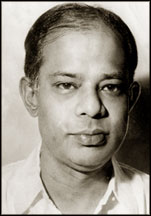A man who belonged to the whole country
by Wijitha NAKKAWITA
|
Ponnambalam
Kandiah was a man who did not belong to Jaffna alone but to the
whole country as his thinking and heart had the greatness to
embrace all communities during his lifetime. He demonstrated
that his political credo was to bring unity among all people of
the country. |
|

Ponnambalam Kandiah
|
They say the good die young. One could be very sure there was some
truth in that though there are some good people who live to ripe old
age. He died young, at only 46 years. He was tall, at least six feet.
Yet he stood even taller with his intellectual standing, sensitivity and
empathy to all people of his times. Yet for all his achievements and
position his humility, the hallmark of the true intellectual never
deserted him.
Ponnambalam Kandiah was a man who did not belong to Jaffna alone but
to the whole country as his thinking and heart had the greatness to
embrace all communities during his lifetime. He demonstrated that his
political credo was to bring unity among all people of the country.
In 1958 addressing a public meeting at Peradeniya he said the Tamil
people and the Sinhalese people at the ordinary man's level did not know
each other well. The farmers of Jaffna or Batticaloa did not know the
farmers of Galle or Matara but only the capitalists among the Sinhalese
and Tamils were united. Therefore, the common people of the north and
the south should get to know one another to achieve national unity.
The majority of politicians of the north who followed Kandiah's
generation of the north had deserted the noble path that people like him
trod on. Most of them had taken to extol the virtues of the terrorist
groups and want only to divide the country. Listening to the Tamil
political `thambys' even in parliament today one begins to wonder
whether most of them possess humanist or animist traits of character.
Kandiah was one of the first politicians from the North to propose
devolution of power as one of the factors that could achieve unity among
the north and the south. He was a kind, soft spoken man, not cut out to
be a politician bawling atop platforms, a scholar who had the patience
to engage in research.
The very first time we met him in Colombo was in 1957 teaching a
group of working class people at the Workers Centre, Slave Island. The
subject he taught was economics and banking. Of course he did not charge
for his classes.
It was an honorary exercise and a service for the working class of
Colombo.
His next labour of love was reorganizing the Colombo public library
that was so disorganized that it could take anything between 15 minutes
and one hour to find a book in it. Kandiah volunteered to help the
Colombo Public Library and reorganized under the methods of library
science that he had also qualified in library science. After he
reorganized the public library in the late 1950s it became a real
library not a building with book racks in disorder.
P. Kandiah who had his schooling at Hindu College Jaffna, and after
completing his school education he entered the university of London and
later earned a master's degree in economics from the Cambridge
University. It was during that time he met the Sri Lankan students
Pieter Keuneman. S. A. Wickramasinghe and others who too were fascinated
with the marxist ideas. In 1943 after his return to Sri Lanka he joined
the other young leftists and was one of the founders of the Ceylon
Communist Party.
He was very active among the working class and he spent almost all
his time in Colombo working among people of all three communities as all
of them were his comrades.
One could not forget that he was never ruffled or hasty but very
patient and thoughtful when he taught others what he had learned. At the
budget debates he was even more skilled than even Dr.N.M.Perera or most
others in the opposition.
During the budget debate of 1957 Kandiah proved in Parliament that
the statistics provided by the then Finance Minister were wrong and he
produced the corrected statistics to the amazement of the Speaker and
the House. He said the budget did not have a plan and was a reflection
of a sad state of affairs of a government without a plan. But it was 14
governments in one. Each minister is a government!
However, critical or incisive his speeches were, he was
uncompromising on the unity of the working class for whom he worked and
lived. For him there was no racial or ethnic division but the motivation
to unite all communities. The good die young. Ponnambalam Kandiah was
only 46 years old when he died in September 1960. |


